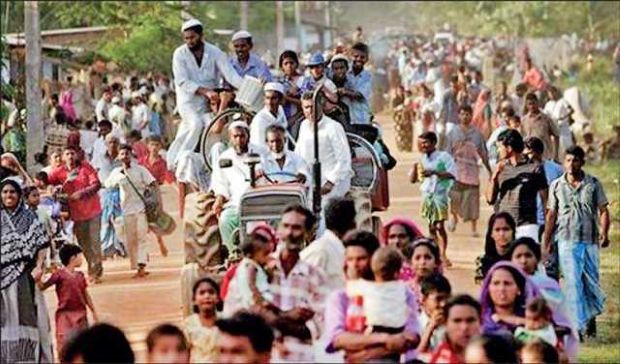From memory to justice: Sri Lanka’s moral debt to 75,000 expelled Northern Muslims

October 2025 marks the 35th anniversary of another dark chapter etched into Sri Lanka’s history – the mass expulsion of over 75,000 Tamil-speaking Muslims from the Northern Province in 1990. The eviction stands today not merely as a painful historical fact but as a stark reminder of the urgent moral accountability and reconciliation Sri Lanka must embrace to heal its fractured society and uphold justice for all communities.
The Liberation Tigers of Tamil Eelam (LTTE), in a cruel twist of betrayal, targeted their linguistic brethren in a ruthless act of ethnic cleansing. The expulsion, executed with chilling coldness and efficiency, uprooted thousands of families from their ancestral homes in Jaffna, Mannar, Kilinochchi, Mullaitivu, and parts of Vavuniya under threats of violence, deprivation of possessions, and truncated notice. The displaced were thrust into internal displacement, often living in camps in Puttalam for decades, enduring systemic neglect, land dispossession, and limited support from governments.
Recognizing and addressing this injustice is no longer optional; it is a moral imperative. The harm suffered by Northern Muslims has too often been overlooked in national truth-seeking efforts and resettlement policies. Their exclusion from reparations, land restitution, and political acknowledgement compounds their trauma, deepening grievances and undermining national reconciliation. The failure to incorporate their experiences in transitional justice mechanisms and truth commissions reflects gaps in Sri Lanka’s collective conscience and undermines the integrity of any genuine peacebuilding effort.
Moral accountability demands that all actors, state and non-state, acknowledge the past with honesty. The LTTE’s role in orchestrating ethnic cleansing must be unequivocally recognized. Governments must accept responsibility for the decades-long failure to facilitate safe, dignified returns and provide reparations and protection for displaced communities. This requires confronting uncomfortable truths and moving beyond politicized narratives that prioritize expediency over justice.
Reconciliation, deeply tied to accountability, requires creating inclusive spaces where Northern Muslims can voice their pain, hopes, and aspirations. It necessitates rebuilding trust between communities fractured by the scars of eviction and war. True reconciliation empowers victims and fosters empathy, turning isolated narratives of suffering into shared commitments to justice and peace.
A poignant proposal put forth by women’s and minority advocacy groups calls for the government to issue a commemorative postal stamp to mark the 35th anniversary of the eviction. While symbolically modest, this initiative carries profound significance. It signals official recognition of historical wrongs, honours the resilience of Northern Muslims, and invites the nation to engage with this painful chapter honestly. The stamp would not merely memorialize the past but also amplify calls for tangible policy actions addressing grievances, land rights, and reparative justice.
Further policy recommendations urge the formal acknowledgement of the 1990 expulsion as an act of ethnic cleansing and its inclusion within transitional justice frameworks. They call for integrating Northern Muslims’ right to return into ongoing resettlement and reconciliation strategies, ensuring displaced communities actively participate in shaping restitution mechanisms and social reintegration plans. These steps are paramount for restoring dignity, social equity, and trust in state institutions.
Northern Muslims’ suffering has been compounded by political sidelining. Many displaced feel abandoned by successive political leaders who, despite occupying government offices, have failed to champion substantive solutions for resettlement and justice. The persistent delays in land restitution and social integration perpetuate cycles of marginalization and reinforce feelings of exclusion from the national narrative. This cynical political inertia undermines Sri Lanka’s broader reconciliation efforts and contributes to communal mistrust.
The 35th anniversary is thus not just an occasion for remembrance but a pivotal moment for transformation. It demands honest reckoning and substantive action to close a painful chapter and open the door to lasting peace. It invites Sri Lanka to demonstrate that its commitment to reconciliation embraces all communities affected by conflict, not selective histories.
Sri Lanka’s future depends on expanding the scope of moral accountability and reconciliation beyond simplistic binaries of victim and perpetrator. It requires acknowledging the multiple narratives of suffering and survival that define its complex social fabric. Only through inclusive dialogue, justice for all victims, and genuine communal healing can the wounds of displacement and betrayal begin to fade.
As this anniversary draws near, Sri Lanka faces a crucial test of its national conscience. Will it recognize the historical injustice inflicted upon the Northern Muslims? Will it honour their resilience by translating memory into meaningful justice, restitution, and reconciliation? Or will it allow another generation to carry the burden of silence, exclusion, and unresolved pain?
The answers lie not merely in words but in policies, reparations, and sustained efforts to rebuild fractured communities. Prompt and meaningful government action, symbolized by the proposed memorial stamp, integrated transitional justice, and participatory return policies, would affirm that Sri Lanka honours all its citizens equally and is committed to an inclusive, just future.
In profound reflection of the past and hopeful anticipation of a better tomorrow, this landmark anniversary must awaken Sri Lanka’s collective responsibility to embrace moral accountability and reconciliation as the pathways to genuine peace and healing for the Northern Muslims and, indeed, the entire nation.
-ENCL


Comments are closed, but trackbacks and pingbacks are open.